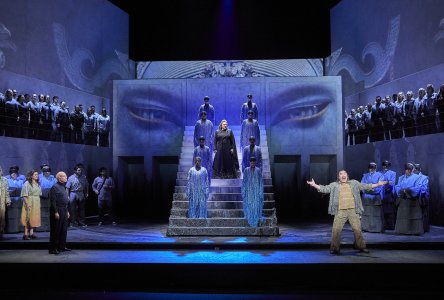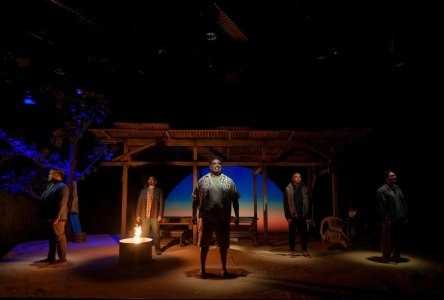
HAMLET - OPERA AUSTRALIA 2024
HAMLET, Opera Australia in the Joan Sutherland Opera Theatre, Sydney Opera House, 20 July-9 August 2024. Photography by Keith Saunders: Hamlet and the OA Chorus; below - Catherine Carby and Lorina Gore; below again - Allan Clayton and Jud Arthur
Sydney’s opening night of the Neil Armfield-Brett Dean-Matthew Jocelyn version of Hamlet was preceded in 2018 by its Australian premiere at the Adelaide Festival. Then I wrote a five-star review. Some cast changes and the smaller stage have not changed that – arguably the claustrophobic sensation of the concentrated family tragedy is now heightened. So, here’s an edit from 2018…
A successful major new opera is rare enough, that it’s virtually homegrown is, frankly, a cause for celebration and pride. The world premiere of Australian composer Brett Dean’s Hamlet was a sensation at Glyndebourne (2017) and, after the artistic and popular triumph of the Kosky/Handel Saul in Adelaide, achieving an equally compelling international yet locally-focused centrepiece would have been impossible if Hamlet had not already been in the wings. As it is, Hamlet surpasses expectations and is in every sense a landmark event.
Dean and Canadian librettist Matthew Jocelyn begin in the way they mean to go on: grabbing Shakespeare’s fabled words in both hands from as many versions as suit their vision. At an elegant gathering in Elsinore a fragmented “...be or not to be, or not to be...” electrifies and will recur throughout, as English tenor Allan Clayton wrestles with his demons and agonised rage at what happened to his beloved father. (And is now performing the role for the last time, he says.)
Hamlet’s miserable plight is palpable in the presence of his mother Queen Gertrude (Catherine Carby) and uncle, the usurping Claudius (Rod Gilfry) as they prowl and preen at the banquet. Hamlet is lightheaded with misery, the life of his mind is on the brink of collapse. It is soon matched by the unhappy bewilderment of his soulmate Ophelia (Lorina Gore) when he pushes her away and unwittingly adds to her sense of displacement.

Remarkably, Shakespeare’s tragedy is both compressed and expanded in the opera. That’s because the music takes on much of the burden of character and narrative so the play and its characters are stripped bare and its inner workings are depicted by the Opera Australia Orchestra under conductor Tim Anderson.
The score is at once unsettling and playful, dreamlike and grounded. It is way beyond mere backdrop or support for the voices but neither does it overpower. It’s an astonishing achievement as the ensemble is augmented by percussion, electronics, and voices high up in stage-side boxes, and a dynamic and disciplined onstage Opera Australia Chorus.
This Hamlet is a fast-moving three hours, plus a half-hour interval and the set design and lighting are in on the action as the Enlightenment white walls and tall windows are pushed and pulled to different positions and effects. (Set design, Ralph Myers, lighting Jon Clark.) It’s a reminder – as the bare timber struts and a rack of costumes are casually revealed and incorporated – that all the world’s a stage and this place even more so than usual (also underlined by Alice Babidge's almost-everyday costumes).
Theatricality and a lighter note are wittily to the fore in the counter-tenor characters of Rosencrantz (Russell Harcourt) and Guildenstern (Christopher Lowrey). They’re not sent to England with Hamlet but rather, remain in Elsinore as observing, twittering participants to the unfolding disaster. They are a vocal and dramatic counterweight to Jud Arthur’s Ghost and further evidence of the thoughtful brilliance at work.

Further moral and emotional positioning are acted and sung by tenor Kanen Breen as a fine, sinister Polonius, while Nicholas Jones’s supercilious Laertes is on the opposite end of the spectrum from Samuel Dundas’s Horatio. The play’s famous set pieces are visually and dramatically satisfying, in particular, the grave-digging scene is a coup de theatre, and Jud Arthur’s doubling as the Gravedigger is perfect.
Ophelia’s rejection and subsequent disintegration have rarely been as affecting as played and sung by Lorina Gore. Her initial athleticism and physical confidence add a dreadful #metoo element to what happens and the result is genuinely shocking.
This is also in part due to Catherine Carby’s Gertrude. She is a woman who knows she’s a political parcel, passed around the royal court and as immaterial as any chattel. Her dignity and compassion towards Ophelia are a painful contrast to how she is treated and the two women excel in their portrayals, both vocally and histrionically.
Meanwhile, Neil Armfield’s direction maintains the forward momentum to the ultimate bloodbath without sacrificing humanity or emotion. This Hamlet is an unforgettable achievement with the remarkable Allan Clayton at its heart. Those lucky enough to see it will know they’ve witnessed something special.
Comments
Leave a Comment
Enter your username and password to comment. Don't have a username? Register now.




Be the first to leave a comment below